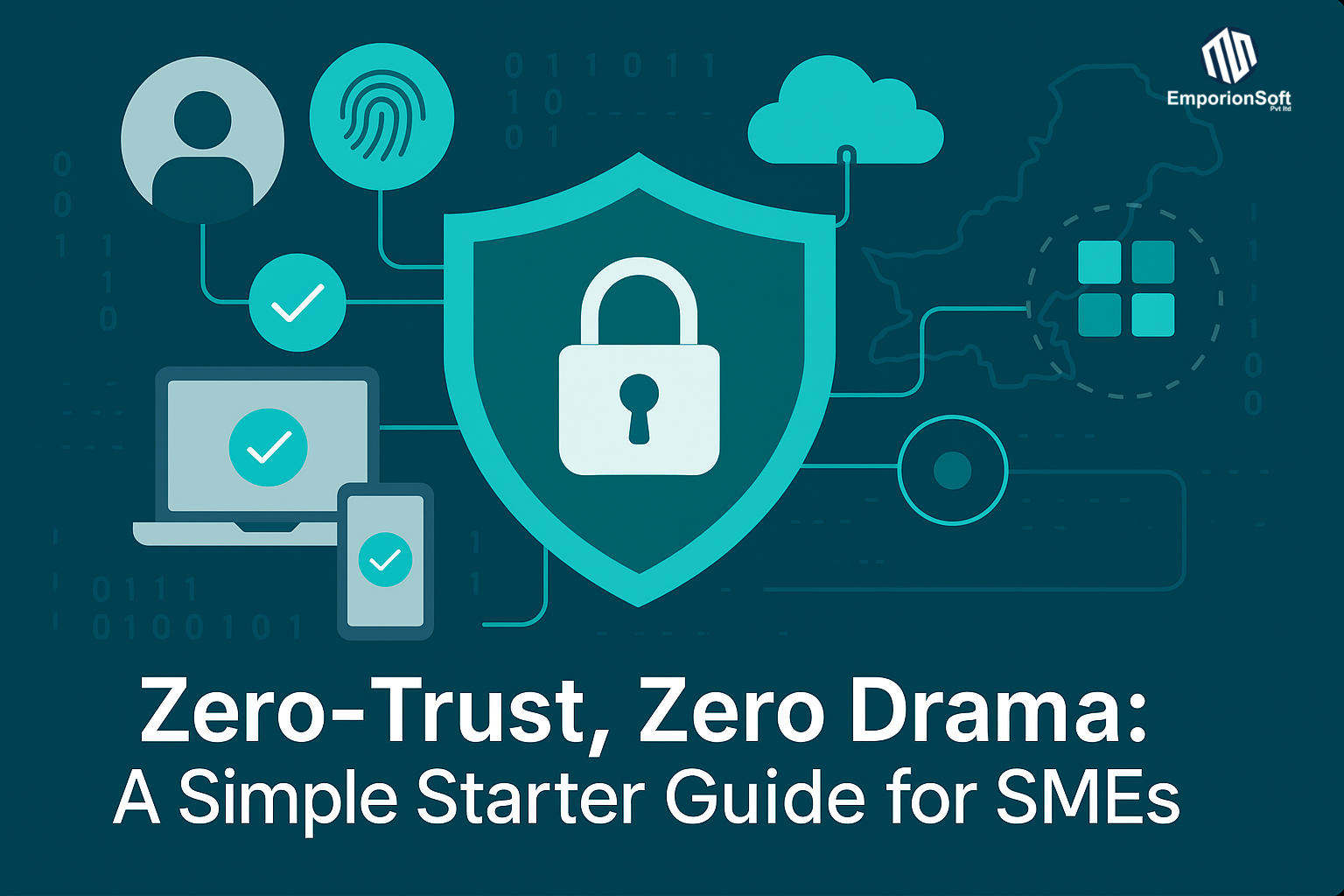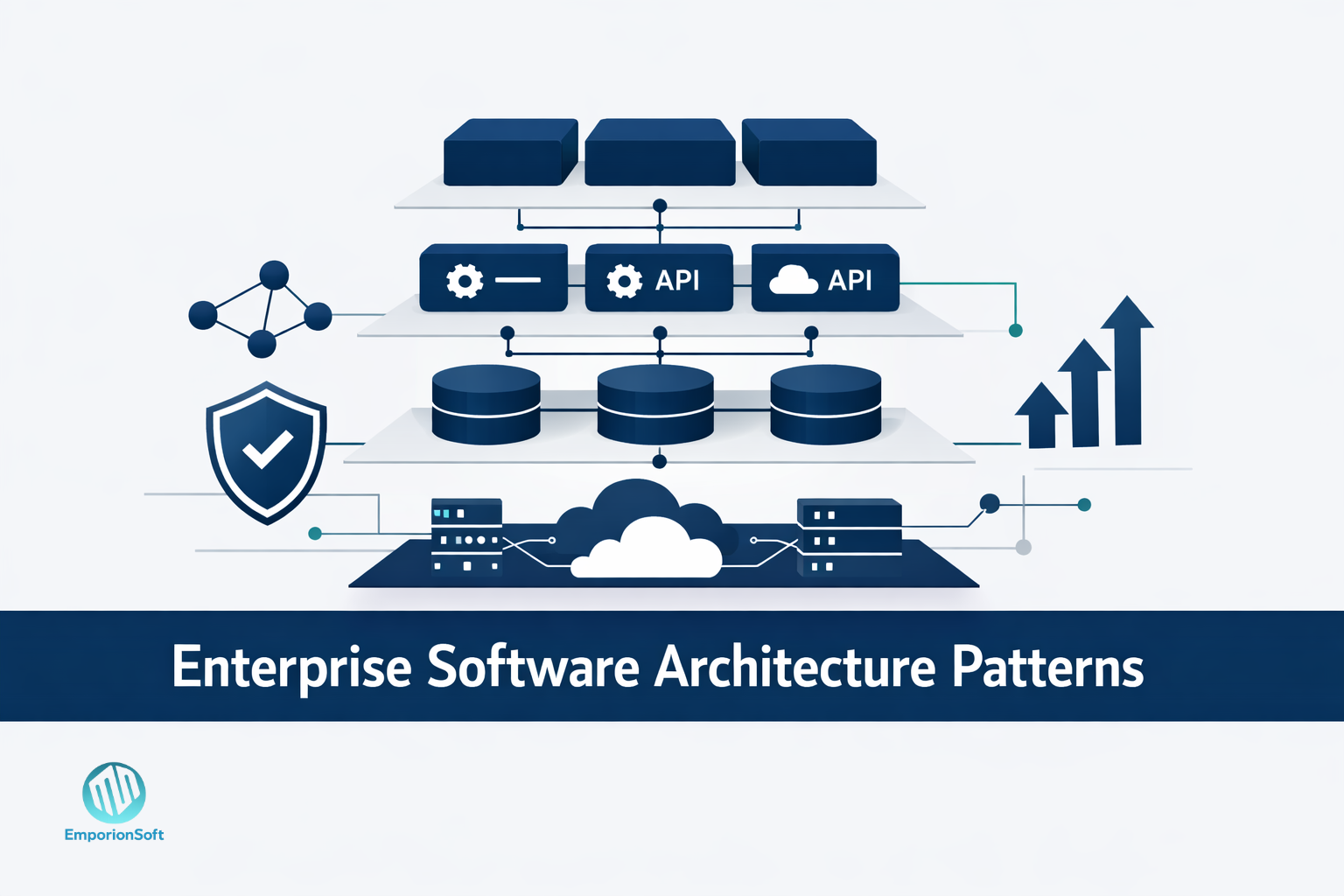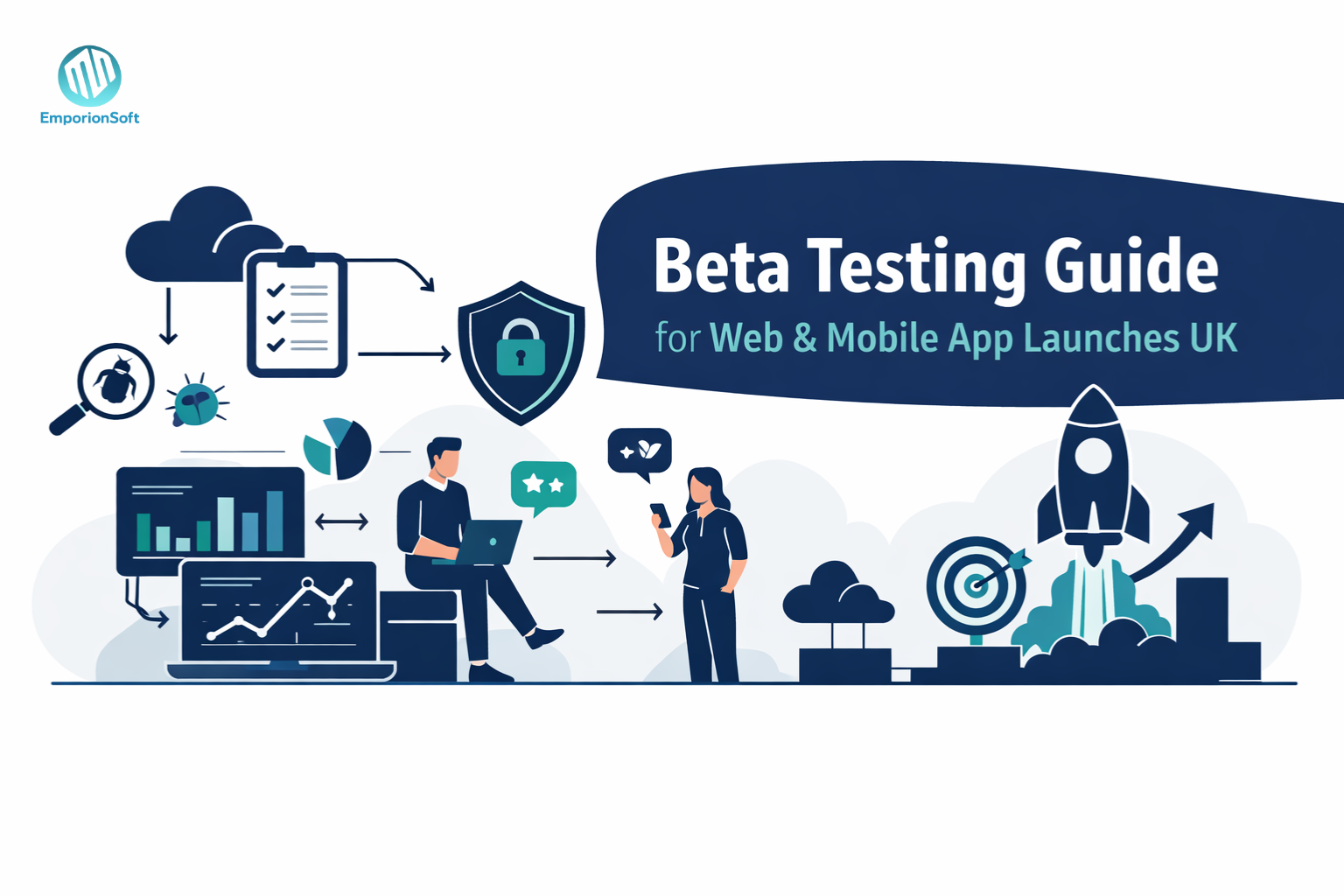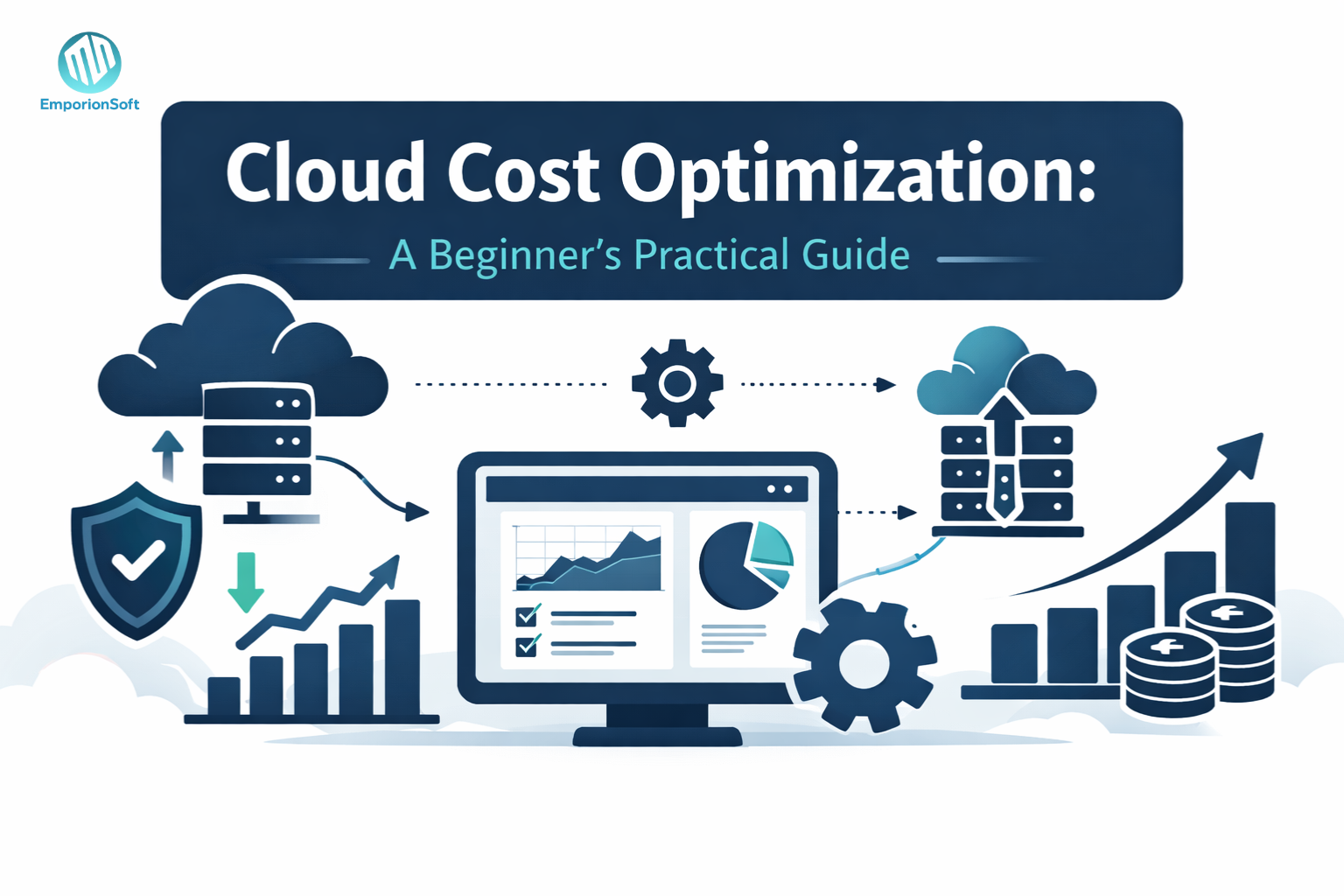A cyber-attack doesn’t always begin with a dramatic breach. Sometimes it starts quietly — a single reused password, an outdated laptop, or an employee clicking an innocent-looking link. For many SMEs in Pakistan, this silent entry point becomes the moment everything unravels. That’s exactly why zero trust security for small business is no longer optional; it’s becoming the new baseline for staying safe, operational, and competitive in a digital-first market.
Traditional security assumed that anyone inside your network could be trusted. But today’s attackers don’t care about your size, industry, or budget. They care about the easiest target. And small businesses often become the most attractive ones. With rising threats, compliance expectations, and hybrid working models, SMEs need an approach that reduces risk without introducing unnecessary technical drama — and that’s where Zero Trust steps in.
What Is Zero Trust Security for Small Business?
Zero Trust is built on one simple rule: never trust, always verify. Instead of assuming users, devices, or applications are safe because they’re inside the network, Zero Trust forces every request to be authenticated, validated, and continuously monitored. This shift makes zero trust security for small business a powerful foundation in today’s threat landscape — especially for organisations with limited security resources.
For SMEs trying to understand what is zero trust security for SMBs in Pakistan, think of it as placing digital locks on every door instead of keeping just one big lock at the front. Even if one part of your system is compromised, attackers cannot freely move through the rest.
As zero trust security Pakistan gains traction across finance, retail, logistics, manufacturing, and tech sectors, more businesses are adopting it to protect sensitive data without building overly complicated IT systems. It aligns perfectly with the needs of SMEs that want a practical, scalable way to strengthen small business cybersecurity Pakistan without relying on large teams or expensive infrastructure.
If you want to explore how modern software teams approach secure systems, the EmporionSoft Services page offers insights into robust engineering and implementation strategies
🔗 https://emporionsoft.com/services/
You can also learn more about our mission, expertise, and global footprint here:
🔗 https://emporionsoft.com/about/
According to external guidance from NIST’s Zero Trust Framework, organisations that adopt Zero Trust drastically reduce lateral movement risks and improve their overall cyber resilience — a benefit especially critical for small businesses that cannot afford prolonged downtime or data loss.
Why Traditional Perimeter Security Fails Pakistani SMEs
For years, SMEs relied on perimeter-based security — firewalls, antivirus tools, and VPNs — assuming these layers would keep threats out. But today’s attackers don’t always come “from outside.” They might enter through a compromised email account, a stolen device, or a cloud login reused across multiple apps.
Small businesses also face rising insider threats, third-party access risks, cloud misconfigurations, and remote work vulnerabilities. This exposes the core weakness of perimeter security: it trusts too easily and checks too little.
In contrast, zero trust cybersecurity Pakistan focuses on granular controls, identity-based access, and continuous monitoring. It doesn’t care where the user is logging in from — Lahore, Karachi, Islamabad, or abroad — it simply ensures they are authenticated, authorised, and legitimate at every step.
As Pakistani SMEs continue embracing digital tools, cloud platforms, and remote workflows, the need for zero trust security for small business becomes even more pressing. This shift isn’t about fear. It’s about building confidence, stability, and operational continuity in an increasingly complex digital world.
Cyber attackers don’t break in through the front door anymore — they slip in through forgotten accounts, weak passwords, and unsecured devices. That’s why SMEs across Pakistan are rapidly shifting towards a zero trust architecture small business Pakistan approach, building security that’s proactive rather than reactive.
Zero Trust isn’t a single product. It’s a mindset, a structure, and a long-term plan. For many SMEs, it offers a practical blueprint for reducing risk without creating unnecessary complexity. And as remote work, cloud adoption, and third-party integrations grow in Pakistan’s business ecosystem, the zero trust model for SMBs Pakistan is emerging as the strongest defence against modern cyber-attacks.
Core Building Blocks of Zero Trust Architecture
At its heart, Zero Trust assumes every user, device, and service could be compromised — so nothing is trusted by default. This model is especially relevant for small businesses that rely on hybrid teams, cloud storage, and distributed workflows.
A properly implemented zero trust framework Pakistan is built on a few essential components:
1. Strong Identity and Access Management (IAM)
Identity is the new perimeter. Passwords alone are no longer enough. Multi-factor authentication (MFA), strict verification, and role-based access are crucial. Tools that support identity and access management Pakistan help ensure that every login attempt is authenticated, authorised, and context-aware.
2. Device Verification and Monitoring
Every laptop, phone, or tablet accessing business data must be identified and checked. This prevents compromised devices from becoming entry points for attackers.
3. Least Privilege Enforcement
No employee should have more access than necessary. This limits damage in case of compromised accounts and stops threats from moving laterally through the network.
4. Micro-Segmentation
Instead of having one large network, Zero Trust divides your systems into smaller, isolated segments. If one part is breached, attackers can’t move freely to others.
5. Continuous Monitoring and Analytics
Zero Trust relies on ongoing evaluation, not one-off checks. Behavioural analytics, anomaly detection, and threat intelligence help spot suspicious activity early.
If your organisation uses AI-driven systems, EmporionSoft’s insights on secure and scalable ML operations may help deepen your understanding:
🔗 https://emporionsoft.com/llmops-scaling-monitoring-and-optimising-large-language-models-in-real-world-apps/
For real-time system behaviour and secure execution pipelines, this resource offers further clarity:
🔗 https://emporionsoft.com/real-time-ai-in-production/
According to guidance from NCSC UK, identity and access verification are the strongest defences against credential-based attacks. Cisco also highlights Zero Trust as a leading strategy for minimising lateral movement across organisational networks.
As Pakistani SMEs adopt more cloud-based tools, the need for a flexible yet robust security foundation becomes more important than ever. A well-designed Zero Trust system ensures every user, device, and service is treated with healthy suspicion — a crucial step in implementing zero trust security for small business effectively.
Identity, Devices, and Continuous Verification
Identity, device posture, and constant validation form the backbone of Zero Trust. If an employee logs into a company system from Lahore in the morning and from Dubai an hour later, something is clearly wrong. Zero Trust immediately flags this behaviour.
Identity controls authenticate users based on login behaviour, role, device type, and additional verification layers.
Device controls ensure each device meets security standards before accessing sensitive data.
Continuous verification checks every interaction, every session, and every data request — regardless of whether the user is inside or outside the network.
This three-layer system keeps small businesses safer without overwhelming teams with complex security setups. It also aligns perfectly with how the zero trust model for SMBs Pakistan operates in real-world environments.
As Zero Trust adoption grows, these components will become essential to how SMEs in Pakistan protect customer data, internal processes, and long-term business continuity.
A small retail business in Lahore recently discovered that a former employee’s email credentials were still active months after they’d left the company. The account was later used in a phishing-based intrusion attempt that nearly compromised customer payment information. Situations like this highlight a critical truth: without strong identity and access management Pakistan, even the smallest oversight can open the door to serious security incidents. This is exactly why modern cybersecurity begins — and succeeds — with identity.
For SMEs embracing zero trust security for small business, the goal is simple: trust no one by default, and verify everyone continuously. That starts with knowing who is accessing your systems, how, and why — every single time.
Identity at the Heart of Zero Trust
Zero Trust shifts the security perimeter away from networks and firewalls and places it directly around the user. Identity becomes the core barrier protecting your business, whether an employee logs in from Karachi, Islamabad, or a remote village where internet speeds are patchy.
Strong identity controls help establish a zero trust policy Pakistan that ensures only legitimate users gain access to sensitive systems. This becomes even more important as SMEs adopt cloud platforms, shared SaaS tools, and remote workforce models.
A modern IAM setup for Pakistani businesses generally includes:
1. Multi-Factor Authentication (MFA)
Passwords alone aren’t enough. MFA adds layers of protection by verifying identity through OTPs, biometrics, or authenticator apps.
2. Single Sign-On (SSO)
Simplifies user access while maintaining strict security standards. Reduces password fatigue and lowers the risk of credential reuse.
3. Role-Based Access Control (RBAC)
Users only receive access relevant to their role, significantly limiting exposure in case of a breach.
4. Continuous Monitoring & Behaviour Analysis
IAM tools track login patterns, geolocation behaviour, and device types to detect anomalies in real time.
To understand modern identity systems deeply, EmporionSoft’s guide on decentralized identity solutions offers valuable insight into how organisations can move toward more secure digital identity models:
🔗 https://emporionsoft.com/decentralized-identity-and-authentication/
Additionally, identity oversights often turn into hidden technical debt. This resource helps teams understand how to eliminate such risks before they escalate:
🔗 https://emporionsoft.com/technical-debt-explained-identify-manage-eliminate/
According to Microsoft’s Zero Trust principles, identity is the foundation of all modern cyber defence strategies — especially for small businesses handling sensitive data or customer records.
Building a Least Privilege Culture in Pakistani SMEs
If identity is the front door of Zero Trust, then least privilege is the rulebook that keeps everyone in their proper room. The idea is straightforward: every user receives only the minimum required access to perform their job. Nothing more.
For many small businesses, this mindset shift is transformative. When properly implemented, least privilege access small business Pakistan reduces the chances of internal misuse — whether intentional or accidental — and prevents attackers from moving freely if they compromise a single user account.
Here’s how SMEs can build a strong least privilege culture:
1. Audit Access Regularly
Remove outdated user accounts. Reduce redundant privileges. Ensure only authorised employees retain access to sensitive systems.
2. Enforce Just-in-Time Access
Grant temporary access for tasks that require elevated privileges. Revoke them immediately after the work is completed.
3. Restrict Lateral Movement
Segment systems so that employees can’t move freely between departments. If an HR user is compromised, the attacker shouldn’t gain access to finance or inventory systems.
4. Educate Staff on Access Hygiene
Training helps teams understand why access rights matter and how improper use exposes the business to risk.
This structured approach forms the backbone of an effective zero trust policy Pakistan, helping SMEs minimise damage even when breaches occur. IBM’s research reinforces that least privilege strategies can reduce insider-related security risks by up to 50%, making it an essential pillar of zero trust security for small business.
By combining strong identity controls with disciplined access management, SMEs can build a resilient Zero Trust foundation that significantly reduces their exposure to everyday cyber threats
Cyber threats rarely announce themselves with loud alarms — they slip quietly from one system to another, moving laterally until they find something valuable. This is where SMEs often face their biggest vulnerability. Without internal barriers, attackers can travel freely once they gain entry. That’s why micro-segmentation small business Pakistan has become a crucial layer in modern Zero Trust strategies, creating controlled zones inside your network to limit movement and damage.
For many SMEs, segmentation sounds technical or complex. In reality, it’s one of the simplest and most effective upgrades that fit naturally within a zero trust framework Pakistan, especially for organisations handling customer data, payments, inventory systems, or sensitive internal workflows.
Micro-Segmentation: The Most Underrated Security Shield for SMEs
Think of micro-segmentation as placing fire doors throughout your digital workspace. Even if one area is compromised, the threat cannot spread unchecked. This internal partitioning is what makes Zero Trust more reliable than traditional perimeter models.
For Pakistani SMEs, benefits include:
1. Blocking Lateral Movement
Attackers can’t jump from your HR systems to finance or from inventory tools to customer databases.
2. Protecting Sensitive Workflows
Critical systems, such as billing, payroll, and customer identity data, stay isolated.
3. Reducing Breach Impact
A compromised device or user account cannot escalate into a full-network disaster.
4. Enabling Granular Policy Enforcement
Every segment can have its own access rules based on user role, department, or sensitivity level.
As businesses adopt cloud tools and digital processes, micro-segmentation becomes even more valuable. Teams using cloud storage, remote work apps, SaaS platforms, or AI-driven systems quickly realise that robust internal boundaries are essential in scaling securely. To understand how SMEs are modernising their data management, EmporionSoft’s insights on cloud-scale data architectures are a useful read:
🔗 https://emporionsoft.com/harnessing-the-power-of-data-lakes-for-scalable-data-driven-software-development/
Additionally, larger internal systems and project workflows can become fragmented over time, making segmentation even more important. This guide on improved process visibility may help SMEs manage complex internal ecosystems more securely:
🔗 https://emporionsoft.com/project-management-tools-for-tech-companies/
CISA highlights micro-segmentation as a top defence strategy for limiting attacker movement inside networks, especially for small organisations that cannot afford extended disruptions or data exposure. This aligns perfectly with the rising interest in zero trust solutions for SMEs Pakistan, where cybersecurity maturity levels vary significantly across industries.
Enforcing ZTNA in Pakistani Business Environments
While micro-segmentation shapes internal boundaries, zero trust network access Pakistan (ZTNA) controls who can enter those boundaries — and under what conditions. ZTNA replaces traditional VPNs by offering secure, identity-based access to specific systems rather than the entire network.
Here’s why ZTNA matters for SMEs:
1. Users Access Only What They Need
Employees don’t receive blanket access. Instead, they are allowed into specific applications or segments based on role and verification.
2. Stronger Remote Work Protection
Remote devices, personal laptops, and off-site teams connect securely with real-time identity validation.
3. Continuous Verification
ZTNA checks every request, every session, every change in device state — ensuring users remain trustworthy throughout the interaction.
4. Cloud-Native Security
ZTNA integrates naturally with SaaS platforms, public cloud tools, and hybrid environments used by modern SMEs.
When implemented together, micro-segmentation and ZTNA form the backbone of a resilient zero trust framework Pakistan. They ensure that even if an attacker breaches your system, their movement is restricted, monitored, and eventually blocked.
Google Cloud’s Zero Trust guidelines reinforce this layered approach, emphasising segmentation plus identity-driven access as the two most effective ways to secure modern distributed environments.
For Pakistani SMEs navigating a growing digital economy, these combined strategies offer a practical pathway to strengthen internal defences without overhauling their entire IT infrastructure
The rise of hybrid work in Pakistan has transformed how small businesses operate. Teams now collaborate across cities, devices, and networks — often from homes, cafés, co-working spaces, or even in transit. But with this flexibility comes real risk. A single unsecured Wi-Fi network or outdated laptop can expose an entire organisation to attack. This is where Zero Trust becomes a lifeline for remote work security Pakistan small business, ensuring teams stay protected no matter where they log in from.
Hybrid working isn’t going away. SMEs adopting cloud platforms, shared SaaS tools, and distributed teams need stronger verification, smarter access policies, and tighter control over devices. Zero Trust delivers exactly that — without adding friction to the employee experience.
Zero Trust for Remote Teams: No Trust, No Problem
Zero Trust fundamentally changes how remote access works. Instead of relying on traditional VPNs that open the entire network to verified users, Zero Trust limits access based on identity, device posture, and continuous monitoring. This approach is reshaping cybersecurity for small business Pakistan, especially as remote work becomes normal for sales teams, customer support units, and IT staff.
Here’s why the zero trust network access (ZTNA) for small business Pakistan model is becoming the new standard:
1. Identity-Based Access Instead of Location-Based Access
No matter where a user logs in from — Rawalpindi, Multan, or Dubai — zero trust requires them to prove who they are, how they’re connecting, and whether they should access a specific resource.
2. No Broad Network Exposure
Unlike VPNs, ZTNA doesn’t put users “inside” the network. It grants secure, isolated access only to the exact applications they need.
3. Real-Time Context Awareness
ZTNA evaluates session risk on the fly. If a device suddenly appears compromised or behaves unusually, access can be reduced or blocked immediately.
4. Strong Protection for Cloud-First Teams
SMEs adopting cloud storage, collaboration tools, and SaaS solutions benefit directly from ZTNA’s application-level security.
Remote-first SMEs exploring modern infrastructure strategies may find these resources useful:
🔗 https://emporionsoft.com/future-of-cloud-computing/
🔗 https://emporionsoft.com/cloud-providers-comparison-2025/
According to Gartner’s Zero Trust Access Report, ZTNA adoption has seen double-digit annual growth globally as organisations replace VPNs with more agile, identity-centric access strategies — a trend rapidly extending to Pakistani SMEs.
Device Verification & Secure Remote Access
A remote employee’s laptop is often the weakest link in a distributed environment. It may be running outdated software, missing security patches, or connected to unsecured networks. That’s why Zero Trust puts equal emphasis on identity & device verification small business Pakistan zero trust, ensuring both the user and the device are legitimate before granting access.
Device verification helps SMEs enforce:
1. Compliance with Security Standards
Devices must meet baseline requirements — updated OS, active antivirus, encrypted storage — before connecting to sensitive data.
2. Continuous Posture Monitoring
If a device falls out of compliance mid-session, Zero Trust can instantly block or limit access.
3. Segmented Access Based on Device Risk
High-risk devices receive reduced access, protecting critical systems like finance dashboards or customer databases.
4. Zero Trust Enforcement Across All Devices
Whether employees use company-issued systems or personal devices, Zero Trust verifies each endpoint, preventing attackers from exploiting compromised hardware.
This multilayered approach offers the strongest foundation for cybersecurity for small business Pakistan, allowing teams to work freely while keeping security airtight.
By combining identity checks, device posture evaluation, micro-segmentation, and ZTNA, Pakistani SMEs can confidently embrace remote and hybrid work models — without increasing their exposure to modern cyber threats.
Implementing Zero Trust can feel overwhelming at first glance, but most Pakistani SMEs already have the foundations they need — identity controls, basic network policies, and cloud-based tools. The real challenge isn’t technology; it’s creating a structured plan that gradually strengthens every layer of access, verification, and monitoring. For organisations exploring how to implement zero trust security for small business in Pakistan, the roadmap below offers a simple, scalable path forward.
Zero Trust isn’t a one-time deployment. It’s a journey built on continuous improvement and layered defences. With the right sequence, SMEs can strengthen protection without disrupting daily operations or overloading small IT teams. This framework also supports long-term digital transformation goals as businesses shift to cloud-first and distributed environments.
A Simple 7-Step Zero Trust Kickstart Plan
The following step-by-step roadmap helps Pakistani SMEs adopt Zero Trust in a controlled, achievable manner:
1. Map Users, Devices, and Critical Assets
Identify key business systems — finance, inventory, HR, CRM, customer data.
List all users and classify their access requirements.
This becomes your baseline for prioritising risks and access controls.
2. Strengthen Identity Verification
Implement MFA, strong password policies, and role-based access.
Tools aligned with NIST 800-207 recommendations emphasise identity as the core component of Zero Trust.
3. Deploy Least Privilege Access Policies
Give users access only to what they need.
Revoke legacy or dormant accounts.
This step dramatically reduces breach impact.
4. Implement Device Trust & Continuous Monitoring
Ensure all devices meet security standards: updated OS, antivirus, encryption.
Real-time checks help flag risky devices before they connect.
5. Introduce Micro-Segmentation & Application Isolation
Break networks into smaller zones.
Critical systems (finance, payroll, customer records) should be separated.
This limits lateral movement inside the system.
6. Move Toward ZTNA for Secure Remote Access
Replace traditional VPNs with Zero Trust Network Access.
Grant application-level access based on identity and device posture.
7. Establish Ongoing Monitoring & Policy Refinement
Zero Trust evolves over time.
Continuously analyse logs, alert patterns, and access behaviours.
NIST emphasises the importance of adaptive policies based on real-time context.
SMEs working on IT modernisation or system-wide upgrades can explore how adaptive development aligns with Zero Trust principles:
🔗 https://emporionsoft.com/adaptive-software-development/
Additionally, organisations exploring distributed identity models or secure decentralised architecture will find relevant insights here:
🔗 https://emporionsoft.com/practical-blockchain-applications-for-startups/
According to NIST’s Zero Trust Reference Architecture (800-207), these layers collectively create a dynamic security posture where every login, device, and request is continuously validated.
Budgeting & Cost Expectations for Pakistani SMEs
When planning a Zero Trust rollout, many SME owners immediately ask about the zero trust architecture cost for small business Pakistan. The good news is that Zero Trust is highly modular — meaning SMEs can start small, prioritise high-risk areas, and expand gradually.
Here’s how Pakistani SMEs typically approach budgeting:
1. Start with Low-Cost, High-Impact Changes
MFA, passwordless authentication, and basic IAM policies often require minimal financial investment.
Many cloud platforms already include built-in Zero Trust features.
2. Avoid Large Upfront Infrastructure Costs
Zero Trust is more operational than hardware-driven. Businesses rarely need new servers or complex on-prem systems.
3. Evaluate Cloud-Native Security Tools
Modern SaaS tools offer scalable subscriptions based on user count.
This allows businesses to pay only for what they need.
4. Consider Phased Micro-Segmentation
Segmentation can begin with critical systems before expanding.
This approach aligns with the zero trust strategy adoption for Pakistan SMEs, allowing manageable growth.
5. Allocate Budget for Staff Training
Awareness and compliance remain core to the model’s success.
Training reduces accidental risks and enhances long-term adoption.
6. Invest in Monitoring & Analytics
Visibility into user behaviour helps refine policies, detect anomalies, and stay ahead of emerging threats.
7. Plan for Future Scalability
As businesses expand operations, hire remote teams, or introduce cloud services, Zero Trust controls can be extended without major restructuring.
According to global guidance from NIST and cybersecurity leaders, phased adoption offers the best value-to-security ratio for small businesses, particularly those with limited in-house IT personnel.
By following this structured roadmap, Pakistani SMEs can build a strong Zero Trust foundation that enhances cybersecurity, supports digital transformation, and protects their most valuable assets — without excessive complexity or cost.
Many SMEs in Pakistan still view cybersecurity as a cost rather than an investment. But the organisations that adopt Zero Trust quickly realise something different: strong security becomes a growth driver, a trust signal for customers, and a shield against operational disruption. The benefits of zero trust model for Pakistani small business extend far beyond protection — it stabilises operations, strengthens brand reputation, and enables digital transformation without unnecessary risk.
As SMEs move towards cloud adoption, hybrid teams, and AI-driven tools, Zero Trust helps them stay competitive in an increasingly digital landscape. It aligns with modern infrastructure, ensures compliance readiness, and provides a resilient foundation for long-term scaling.
Why Zero Trust Pays Off for Small Businesses
Zero Trust isn’t a luxury designed for large enterprises. It’s a necessity for SMEs that handle customer data, payments, or confidential records — which includes retailers, service providers, healthcare clinics, distributors, and local manufacturing firms across Pakistan.
Here’s why Zero Trust becomes an ROI-positive investment:
1. Reduced Attack Surface
Zero Trust minimises the number of entry points attackers can exploit. Combining identity controls with segmentation ensures threats face barriers at every step.
2. Lower Incident Response Costs
Breaches are expensive. Downtime, data loss, and recovery efforts can cost weeks of productivity. Zero Trust dramatically reduces the financial impact of incidents.
3. Stronger Customer Trust
Clients feel safer working with SMEs that follow cybersecurity best practices for small business Pakistan zero trust. This credibility can directly influence customer retention and business partnerships.
4. Better Alignment with Cloud Modernisation
Cloud-based workflows and SaaS platforms pair naturally with Zero Trust principles. SMEs embracing digital operations benefit from stronger compliance and reduced risk.
5. Enhanced Team Productivity
By enforcing structured access policies, SMEs prevent unnecessary interruptions, credential mismanagement, and unauthorised access attempts.
6. Support for AI and Automation Adoption
Modern AI-driven systems rely on secure architectures. Businesses exploring AI integration may find this helpful:
🔗 https://emporionsoft.com/how-ai-is-revolutionizing-software-development/
Accenture’s cybersecurity insights show that organisations adopting Zero Trust frameworks can reduce breach impact by up to 50% and improve time-to-containment significantly — a critical advantage for small businesses with limited IT resources.
For SMEs in Pakistan, this isn’t just about technology. It’s about staying operational, competitive, and trustworthy in a rapidly evolving digital marketplace.
Reducing Breaches, Downtime, and Financial Losses
One of the biggest micro-segmentation benefits for small business Pakistan security is the dramatic reduction in lateral attack movement. Even if attackers breach one system — perhaps through phishing or a compromised login — they cannot move freely across the network. This isolation restricts damage and buys time for detection and response.
Zero Trust supports sustained operational continuity in several ways:
1. Limiting Lateral Movement
Micro-segmentation ensures each business function remains insulated. A problem in HR systems won’t automatically spread to accounts, sales, or inventory.
2. Faster Detection and Containment
Continuous monitoring helps identify unusual behaviour early, preventing full-scale breaches.
3. Reduced Downtime Costs
SMEs often lack the budget for multi-day recovery efforts. Zero Trust ensures incidents remain smaller and easier to manage.
4. Compliance and Audit Readiness
As regulations increase globally, Pakistani SMEs with solid security structures stand ahead of competitors in tenders, certifications, and client evaluations.
5. Stable Digital Transformation Path
Whether a business is adopting cloud storage, remote workflows, or AI-driven tools, Zero Trust creates a stable security base to build upon.
Firms looking for real-world results and proof of performance can explore EmporionSoft’s portfolio of successful software and security-driven transformations:
🔗 https://emporionsoft.com/case-studies/
According to McKinsey’s cybersecurity research, organisations that adopt Zero Trust improve resilience, reduce breach recovery times, and significantly lower long-term security management costs.
For Pakistani SMEs, these combined advantages translate into more predictable operations, stronger competitive positioning, and the confidence to grow in new digital markets.
The shift toward digital transformation is accelerating across Pakistan, and with it comes a growing need for stronger, smarter defences. The principles we’ve explored — identity-first protection, micro-segmentation, continuous verification, and secure remote access — all point to one clear truth: zero trust security for small business is no longer a theoretical best practice. It’s a practical necessity. SMEs that embrace Zero Trust not only strengthen their defences but also gain operational stability, customer confidence, and long-term resilience.
From identity controls and least privilege to ZTNA and segmentation, the strategy empowers organisations to stay ahead of modern threats while keeping their teams productive. As the digital economy expands and cybercriminals grow more sophisticated, zero trust solutions for SMEs Pakistan offer the clearest pathway to safeguarding systems without adding unnecessary complexity or cost.
The Future of SME Cybersecurity in Pakistan
The cybersecurity landscape in Pakistan is evolving quickly. Small and medium-sized enterprises now face the same level of threat as large corporations — sometimes even more, due to limited IT resources. Zero Trust levels the playing field. It offers a structured, scalable defence that grows with your business, reduces attack surfaces, and protects digital operations across remote teams, cloud systems, and on-premise environments.
Industry research, including insights from Accenture, continues to show that organisations adopting Zero Trust dramatically reduce breach impact and strengthen long-term resilience. For SMEs, this is more than security — it’s a competitive advantage.
With the right implementation partner, Zero Trust becomes achievable, affordable, and aligned with the way modern Pakistani businesses operate.
Ready to Build a Zero Trust Strategy? EmporionSoft Can Help
If you’re ready to protect your business with a smarter, future-proof approach, EmporionSoft is here to guide you every step of the way. Our team specialises in secure software architecture, identity management, and cloud-native infrastructure — helping SMEs implement Zero Trust in a way that’s practical, cost-effective, and tailored to real operational needs.
Whether you want a full assessment of your current systems, a phased implementation roadmap, or ongoing support, we’re ready to help you transform your security posture with confidence.
Start by reaching out to our team today:
🔗 https://emporionsoft.com/contact-us/
Or schedule a personalised consultation to explore the best Zero Trust strategy for your organisation:
🔗 https://emporionsoft.com/consultation/
Your business deserves security that doesn’t just protect — but empowers.
Let EmporionSoft help you build a safer, stronger, and more resilient future with Zero Trust as your foundation.










